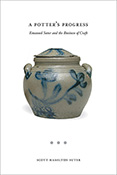A Potter's Progress
Emanuel Suter and the Business of Craft

“This is a well-researched, engaging, and easily accessible case study that will be a welcome addition to the scholarship to Progressive Era history, material culture studies, Mennonite history, and Shenandoah Valley regional history.” —Mark Metzler Sawin, author of Raising Kane: Dr. Kane and the Culture of Fame in Antebellum America
____________________
Born into a traditional culture in 1833, Emanuel Suter cultivated the art of pottery and expanded markets across the Shenandoah Valley of Virginia, creating a thriving company and leaving thousands of examples of utilitarian ceramic ware that have survived down to the present. Drawing on Suter’s diary—rich with meticulous descriptions of his ceramic wares, along with glazing recipes and the quotidian details of nineteenth-century business—as well as myriad other primary and secondary sources, Suter’s great-great-grandson Scott Hamilton Suter tells the story of how a farmer with a seasonal sideline developed into a technologically advanced entrepreneur who operated a modern industrial company. As a farmer, Emanuel Suter innovated by adopting new time-saving equipment; this progressive thinking bled over into his religious life, as he endeavored to change the traditional way of choosing ministers by lot and advocated for the formation of Sunday schools in the Mennonite Church. But Suter largely made his mark as a potter, and A Potter’s Progress is enhanced by nearly two dozen color images and a close study of the techniques (including kilns and jigger wheels), products, shop organization, marketing, and labor of Suter’s shops, revealing the revolutionary role they played in the world of Rockingham County, Virginia, pottery manufacture. This tightly focused case study of the trials and triumphs of one craftsman as he moved from a cottage industry to a full-scale industrial enterprise—prefiguring the market economy that would characterize the twentieth century—serves as a microcosm for examining the American spirit of progress in late nineteenth-century America.
SCOTT HAMILTON SUTER, professor of English and American studies, and director of the Margaret Grattan Weaver Institute for Regional Culture at Bridgewater College, is the author of Shenandoah Valley Folklife and coauthor, with Cheryl Lyon, of two books in the Images of America series: Harrisonburg and Rockingham County.
